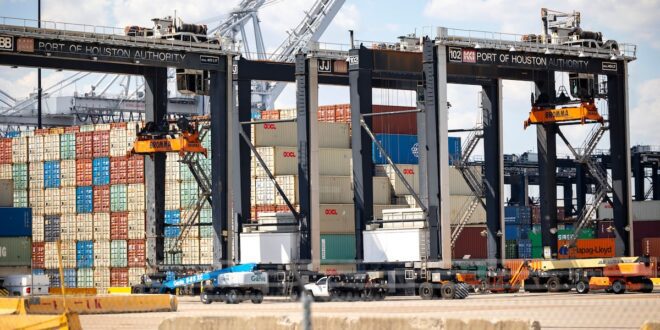Vowing to Stop Machines from Taking Their Jobs
WASHINGTON — (AP) — Vowing to stop machines from taking their jobs, 45,000 U.S. longshoremen are threatening to go on a strike that would shut down ports on the East and Gulf coasts and could damage the American economy just as President-elect Donald Trump returns to the White House.
Negotiations and Potential Strike
Negotiations resume Tuesday between the ILA and the U.S. Maritime Alliance, which represents ports and shippers. The sticking point is a familiar one at America’s ports: machines replacing human labor, specifically semi-automated cranes operated by software or employees working remotely to guide containers onto trucks or trains.
Union’s Stance Against Automation
The union and its president, Harold Daggett, are dead set against allowing additional automation at East and Gulf coast ports. They argue that the machines aren’t any more efficient than human labor.
Impact on Economy
The stakes are high for the U.S. economy. Ports on the East and Gulf coasts handle more than half the nation’s traffic in shipping containers, the steel boxes at the center of world trade, which carry everything from smartphones to fresh fruit to automobiles.
Potential Consequences of a Strike
A strike that lasts less than a week won’t have a material impact on the broader economy, but a longer strike could result in mounting economic costs, rising from an estimated $500 million a day to over $2 billion a day if the strike lasts more than a month.
Precautionary Measures by Companies
Companies are taking steps to pre-empt potential damage from a strike. Some are rerouting shipments to the West Coast or to Canada. The Danish shipping giant Maersk last week urged its customers to pick up loaded containers from ports before Jan. 15.
Salaries and Benefits of Dockworkers
Under their existing contract with the Maritime Alliance, the top-paid dockworkers earn $39 an hour, or $81,000 a year. The top hourly wage would rise to more than $60 an hour under the deal tentatively struck in October.
Automation and Efficiency Debate
There’s little consensus on whether automation improves efficiency at ports – or hurts dockworkers. In 2023, researchers at the Center for Innovation in Transport in Barcelona, Spain, concluded that “there is no clear evidence confirming that automated terminals outperform conventional ones’’ — though they conceded that technological advances could change things in the future.
 Mind Uncharted Explore. Discover. Learn.
Mind Uncharted Explore. Discover. Learn.



